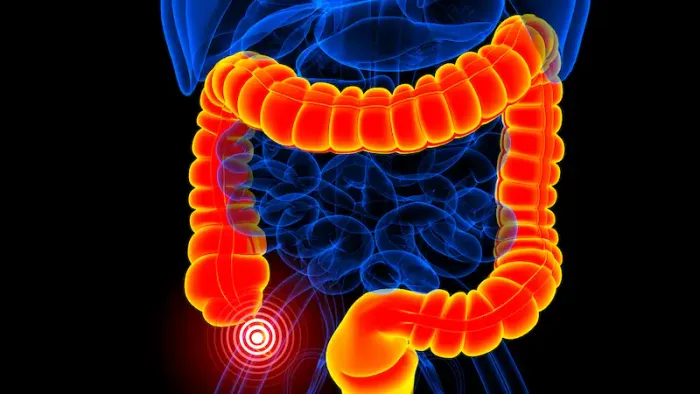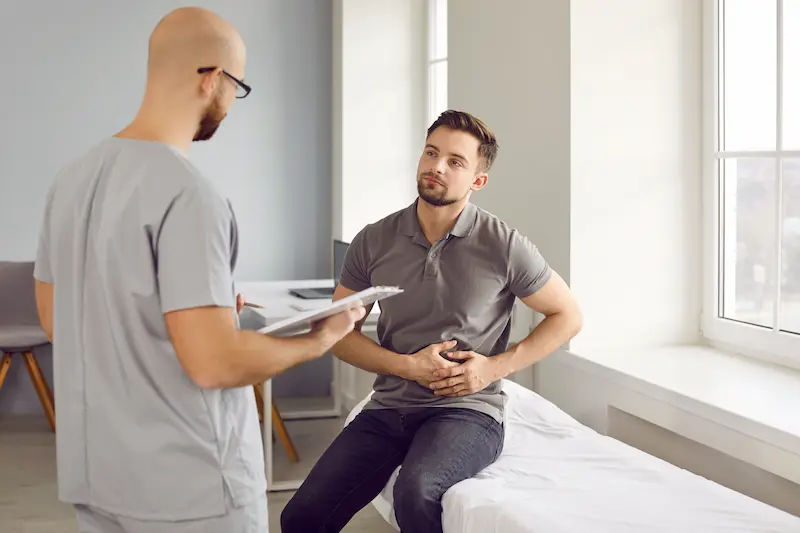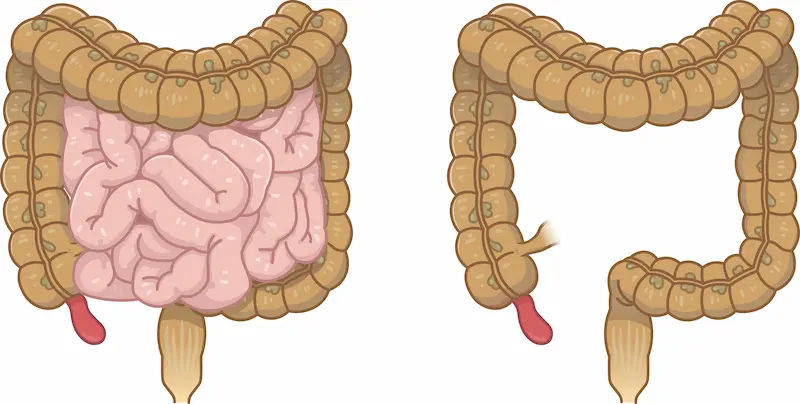Understanding Appendicitis Signs and Treatment Options
Know about appendicitis, what it is, common signs, symptoms, diagnosis, treatment options and tips for smooth recovery.

Written by Dr. Md Yusuf Shareef
Reviewed by Dr. Rohinipriyanka Pondugula MBBS
Last updated on 29th Aug, 2025

Introduction
Appendicitis is a common but serious condition that requires prompt medical attention. If left untreated, it can lead to severe complications. This article will help you understand what appendicitis is, its symptoms, causes, and treatment options, along with tips for recovery and prevention.
What Is Appendicitis?
Appendicitis is the inflammation of the appendix, a small, finger-shaped pouch attached to the large intestine. While the exact function of the appendix is still unclear, an inflamed appendix can cause significant pain and health risks if not treated quickly.
Consult a Gastrointestinal Specialist for Personalised Advice
Common Signs and Symptoms
Recognising the symptoms of appendicitis early can prevent complications. The most common signs include:
1. Abdominal Pain – The pain usually starts around the belly button and shifts to the lower right side of the abdomen. It worsens over time and may become severe.
2. Loss of Appetite – You may feel nauseous and lose interest in eating.
3. Nausea and Vomiting – These symptoms often follow the onset of pain.
4. Fever and Chills – A mild fever may develop as the condition progresses.
5. Bloating and Gas – You may experience discomfort and swelling in the abdomen.
6. Painful Urination or Bowel Movements – Some people feel pain while passing urine or stool.
If you experience these symptoms, especially severe abdominal pain, seek medical help immediately.
What Causes Appendicitis?
The exact cause of appendicitis isn’t always clear, but common triggers include:
• Blockage in the Appendix – Hardened stool, infections, or swollen lymph nodes can block the appendix, leading to inflammation.
• Infection – Bacterial or viral infections in the digestive tract can spread to the appendix.
• Inflammatory Bowel Disease (IBD) – Conditions like Crohn’s disease may increase the risk.
How Is Appendicitis Diagnosed?
Doctors use several methods to diagnose appendicitis:
1. Physical Examination – The doctor will check for tenderness in the lower right abdomen.
2. Blood Tests – To detect signs of infection (high white blood cell count).
3. Urine Tests – To rule out urinary tract infections or kidney stones.
4. Imaging Tests – Ultrasound or CT scans help confirm inflammation in the appendix.
Get Your Health Assessed
Treatment Options
The standard treatment for appendicitis is surgical removal of the appendix (appendectomy). There are two main types:
1. Laparoscopic Surgery – A minimally invasive procedure with small incisions, faster recovery, and less scarring.
2. Open Surgery – Used in severe cases where the appendix has ruptured, requiring a larger incision.
In some mild cases, doctors may prescribe antibiotics to reduce infection before surgery. However, surgery is usually necessary to prevent recurrence.
Recovery After Surgery
Recovery time depends on the type of surgery:
1. Laparoscopic Surgery – Most people recover within 1-2 weeks.
2. Open Surgery – Recovery may take 2-4 weeks, especially if the appendix ruptured.
Tips for a Smooth Recovery:
The tips for recovery include:
• Rest – Avoid strenuous activities for a few weeks.
• Follow a Light Diet – Start with liquids and gradually introduce solid foods.
• Keep the Incision Clean – Follow your doctor’s wound care instructions.
• Take Prescribed Medications – Pain relievers and antibiotics help prevent infection.
• Stay Hydrated – Drink plenty of fluids to aid healing.
Can Appendicitis Be Prevented?
While appendicitis cannot always be prevented, certain lifestyle habits may reduce the risk:
• Eat a High-Fibre Diet – Foods like fruits, vegetables, and whole grains help prevent constipation.
• Stay Hydrated – Drinking enough water supports digestion.
• Avoid Ignoring Digestive Issues – Chronic constipation or infections should be treated promptly.
When to See a Doctor?
If you experience:
• Sudden, worsening abdominal pain
• Persistent nausea and vomiting
• High fever with abdominal discomfort
Do not delay medical care—appendicitis can become life-threatening if the appendix bursts.
Final Thoughts
Appendicitis is a medical emergency that requires prompt attention. Knowing the symptoms and acting fast can prevent complications. If you or a loved one experiences severe abdominal pain, seek medical help without delay.
Consult a Gastrointestinal Specialist for Personalised Advice
Consult a Gastrointestinal Specialist for Personalised Advice

Dr Bhargav Vuppumalla
General Physician/ Internal Medicine Specialist
5 Years • MBBS MD GENERAL MEDICINE
Bengaluru
Apollo Medical Center, Marathahalli, Bengaluru

Dr Harish K C
Gastroenterology/gi Medicine Specialist
15 Years • MBBS MD DM MRCP(UK) (SCE-Gastroenterology and Hepatology)
Bangalore
Manipal Hospital, Bangalore

Dr. Shivaraj Afzalpurkar
Gastroenterology/gi Medicine Specialist
13 Years • MBBS, MD General medicine (Gold medalist), DrNB (Gastroenterology), MNAMS
Bengaluru
Apollo Clinic, JP nagar, Bengaluru

Dr. Paramesh K N
Gastroenterology/gi Medicine Specialist
16 Years • MBBS, MS ( General Surgery), DNB ( Surgical Gastroenterology)
Hyderabad
Sprint Diagnostics Centre, Hyderabad

Dr. Amit Pandita
Gastroenterology/gi Medicine Specialist
10 Years • MBBS. MD (INTERNAL MEDICINE) DrNB (GASTROENTEROLOGY AND HEPATOLOGY)
Delhi
Apollo Hospitals Indraprastha, Delhi
Consult a Gastrointestinal Specialist for Personalised Advice

Dr Bhargav Vuppumalla
General Physician/ Internal Medicine Specialist
5 Years • MBBS MD GENERAL MEDICINE
Bengaluru
Apollo Medical Center, Marathahalli, Bengaluru

Dr Harish K C
Gastroenterology/gi Medicine Specialist
15 Years • MBBS MD DM MRCP(UK) (SCE-Gastroenterology and Hepatology)
Bangalore
Manipal Hospital, Bangalore

Dr. Shivaraj Afzalpurkar
Gastroenterology/gi Medicine Specialist
13 Years • MBBS, MD General medicine (Gold medalist), DrNB (Gastroenterology), MNAMS
Bengaluru
Apollo Clinic, JP nagar, Bengaluru

Dr. Paramesh K N
Gastroenterology/gi Medicine Specialist
16 Years • MBBS, MS ( General Surgery), DNB ( Surgical Gastroenterology)
Hyderabad
Sprint Diagnostics Centre, Hyderabad

Dr. Amit Pandita
Gastroenterology/gi Medicine Specialist
10 Years • MBBS. MD (INTERNAL MEDICINE) DrNB (GASTROENTEROLOGY AND HEPATOLOGY)
Delhi
Apollo Hospitals Indraprastha, Delhi




.webp)
